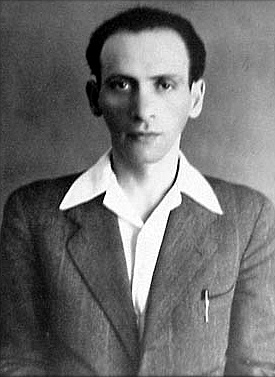
Leib
Batt
1919-2000


 |
Leib Batt 1919-2000 |
 |
 |
One of the last active Yiddish writers to grow up in the rich Jewish culture of pre-war Eastern Europe, Shmuel (Sam) Batt was committed to Yiddish language and literature. Born to a poor family in Shumsk (now in Ukraine), he wrote voluminously in his youth. After the Nazi invasion, he fled into the Soviet interior and fought with the Red Army against the Nazis. When he returned to Volhynia after the War, he found that his entire family had been murdered by the German Army and their sympathizers. He then moved to Lvov to attend law school, and settled with his wife Riva in her hometown of Shepetovka in the USSR (Riva's immediate family had survived the war by fleeing to Stalingrad and Siberia). Shmuel, Riva, and their sons Paul and Edward subsequently moved to Wroclaw, Poland. Shmuel worked both as an attorney and as a journalist and regional editor of the Warsaw Yiddish left-wing daily the Folks-Shtime (the People's Voice). His articles were published in Yiddish newspapers around the world.
In 1970, as the status of Jews in Poland continued to deteriorate, Shmuel and Riva moved to the United States. After some time in Rochester, New York, they settled in Los Angeles. Shmuel became active in the revival of Yiddish in the United States, leading the West Hollywood Yiddish Club and contributing frequently to Yiddish journals and the online discussion group Mendele. Most importantly, Shmuel resumed his writing. His literature, though fiction, draws heavily from events and images in his youth, and reflects the constant shadow of the Shoah.
It was by sheer fortune (seeing a note from him in
a Yiddish newsletter, to be exact) that in February 1998 I discovered
that Shmuel, a very distant cousin to me, was living in Los Angeles.
I had a copy of a family tree that stated that he was in Wroclaw in
1964, but I had otherwise known nothing more of his existence. I
contacted him, and we instantly began a deep friendship. Because I was making
regular visits to my parents in Los Angeles, I was able to have the
pleasure of seeing Shmuel, Riva, and their wonderful family on quite
a number of occasions within a few years, and maintain additional
contact through telephone and email. Shmuel was a great teacher to me
during this time. He had extraordinary passions for Yiddish,
literature, Jewish history, and politics. And, though a rationalist
and opponent of religious orthodoxy, he had enormous knowledge of,
and feeling for, the Bible, Jewish thought, and Jewish practice. He
also had a great love for Israel (even travelling there twice in the
last few years of his life), and believed in the absolute necessity
of trading land for peace with the Palestinians.
Sadly, Shmuel passed away in December 2000. He had an extraordinary mind and a wonderful sense of humor until his final days. He is missed deeply.
=========================================================================
Photographs
of Shmuel Batt and his family.
An article
about Shmuel in the Jewish Journal of Los Angeles.
You can read an article
by Shmuel in Polish about the synagogue in Shumsk. If
anyone is able to translate it for this site, please let me know.
Published works:
Geshtaltn Funem Amol [English title: Images from the Past]. West Hollywood: Samuel Batt Book Committee, 2000
Kleynikaytn, vizyes un nokh [English title: Trifles, Visions and More]. West Hollywood: Samuel Batt Book Committee, 1999
Farn koved funem folk [English title: For the People's Honor] Screenplay. Los Angeles, CA: West Hollywood Yiddish Culture Club, 1999
Oyf eybik; oysgeveylte shriftn 1970-1996 [English title: For Eternity: Selected Writings 1970-1996] Los Angeles: Shmuel Batt Book Committee, 1996
.